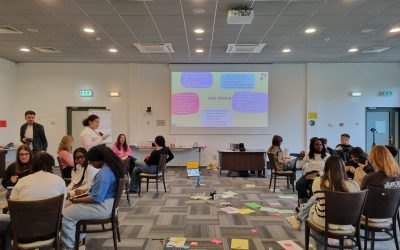As the world marks the 30th anniversary of the Beijing Conference and Platform for Action, universities across Europe are taking a hard look at the persistence of sexual harassment in higher education. Despite progress in gender equality policies, recent findings reveal that sexual harassment remains a widespread issue in academia, underscoring the urgent need for renewed action.
The 1995 Beijing Declaration was a historic commitment by 189 countries to eliminate gender-based violence, including sexual harassment in education. Three decades later, Uni4Equity, dedicated to tackling sexual harassment in European universities, is leading a review of the progress made and the challenges that remain.
The reality of sexual harassment in universities
Sexual harassment in universities is a pervasive problem that affects both students and staff. According to 2024 research conducted by the Uni4Equity in six universities, one in three individuals in European universities experiences some form of sexual harassment.
Specifically, it found that between 26.9% and 43.5% of respondents have experienced at least 1 situation of sexual harassment at university, and between 5.4% and 11.3% of respondents have experienced at least 1 situation of sexual violence.
Certain groups are more at risk: young women and people from ethnic and sexual minority groups such as LGBTQIA+, non-binary people, migrants and foreign students, are overrepresented among the victims and survivors of sexual harassment.
The need for a culture change
Universities are conducive workplaces to harassment, due in part to their historically hierarchical structures. Relying on unequal power dynamics, such frameworks normalise abusive behaviour and allow harassment to go unreported and unpunished, seen as a byproduct of the patriarchal, sexist culture.
This explains, on the one hand, that only 38.5% of people working or studying at university are conscious that sexual harassment might be happening there; and, on the other hand, that 42% of victims and survivors never tell anyone about it – while less than 8% report the incident to the university.
The 2024 Uni4Equity research found that fear of retaliation, lack of trust in institutional mechanisms, and internalised victim-blaming were the main reasons why people did not report.
“There is still a lot of victim-blaming narratives regarding sexual harassment, due to cultural norms, biases, and stereotypes that normalise violence,” explains researcher Mafalda Sousa from the University of Maia (Portugal).
“To overcome this and change cultural attitudes, we need to raise awareness of sexual harassment and gender-based violence, but we also need to create safe reporting systems and provide support to victims. Or we will not break the stigma.”
How education and policies go hand in hand to bring about progress
The past three decades have seen significant advancements in gender equality policies in universities. Higher education institutions have established specialised support services, introduced training programmes, and developed codes of conduct to address harassment.
The European Union’s 2022 requirement for institutions seeking Horizon Europe funding to have a Gender Equality Plan has also incentivised universities to take action.
Raising awareness through education and training is a key component of Uni4Equity’s mission; the six participating universities have been delivering workshops to sensitise their communities of students, academics and professional services staff on the varied forms of sexual harassment, as well as educating them on how best to respond to support those experiencing it.
“Bystanders play a crucial role in preventing harassment,” says Stefano Porru, Professor in the Department of Diagnostics and Public Health at the University of Verona (Italy). “Listening to survivors, offering them positive support, and helping them navigate reporting systems can make a real difference.”
Uni4Equity advocates for universities to adopt a holistic approach to effectively fight against sexual harassment: clear and enforceable policies, active bystander training, and awareness campaigns. Universities must ensure that both students and staff know about available resources, including hotlines, legal aid, and counselling services.
Looking forward: The role of universities in prevention
“We have identified a positive shift when it comes to sexual harassment in universities over the last 10 years or so. Mechanisms for collecting confidential information and reporting sexual harassment didn’t exist, now they do,” concludes Carmen Vives Cases, Vice-Rector for Equality, Inclusion, and Social Responsibility at the University of Alicante (Spain) and coordinator of Uni4Equity.
“And it goes deeper: seeing young women not tolerate sexual harassment, the fact that they don’t accept it as part of the game, that gives hope to people that an end to sexual harassment is in fact possible.”
With Beijing+30 serving as a moment of reflection, the work of projects like Uni4Equity highlights the need for continuous action. As the world evaluates the progress made since 1995, the message is clear: the fight against sexual harassment in universities is far from over, but the momentum for change is stronger than ever.
About the project
Uni4Equity – Strengthening Universities response to sexual harassment with an equity approach is funded by CERV-2022-DAPHNE programme.
Partners
- UNIVERSIDAD DE ALICANTE (Spagna, coordinatore)
- CESIE ETS (Italia)
- MAIEUTICA COOPERATIVA DE ENSINO SUPERIOR CRL (Portogallo)
- APLICA INVESTIGACION Y TRASLACION S. COOP. MAD. (Spagna)
- UNIWERSYTET IM. ADAMA MICKIEWICZA W POZNANIU (Polonia)
- FACHHOCHSCHULE BURGENLAND GMBH (Austria)
- UNIVERSITA DEGLI STUDI DI VERONA (Italia)
- UNIVERSITEIT ANTWERPEN (Belgio)
For further information
Read the project sheet and follow us on Facebook and Instagram.
Contact Maryna Manchenko: maryna.manchenko@cesie.org.









